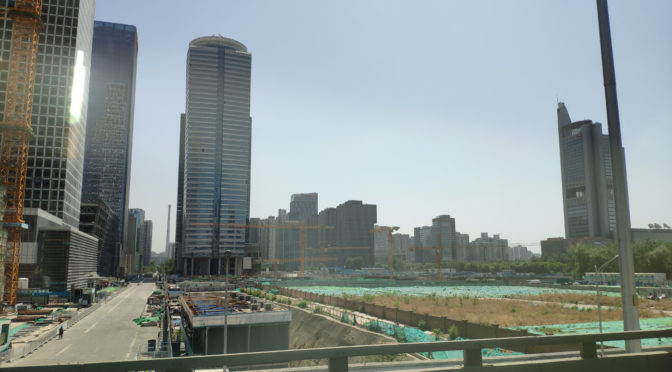Last year I wrote a post about some of the changes I had seen upon my return to Beijing after a brief hiatus in 2017. You can read that post here.
Given the current media and geopolitical climate, I thought I’d write up another little post on what I’ve seen change over the last year. Sadly, I think you’ll be disappointed. What has changed?
Given all the media hubbub around the “trade war” between the US and China, nothing has noticeably changed, and I emphasize those words because, on the surface, all of the big changes have already been put in place, namely, the red brickings, in which Beijing removed many establishments by covering up the shops with bricks. However, speak to any one who has been here long enough and they’ll all agree that Beijing (and China as a whole) has changed quite a bit since ten years ago. I’ve even noticed that within my short time in the country that things have become just a little bit more difficult in some areas.
Anyway, below are a few of the changes I’ve noticed.
VPN disruption
There have always been challenges connecting to the global internet outside of China, but this year has seen VPNs rendered practically completely useless. There are still some ways around the blockages but, with the continuing trade war meetings, the blockages are happening more often.
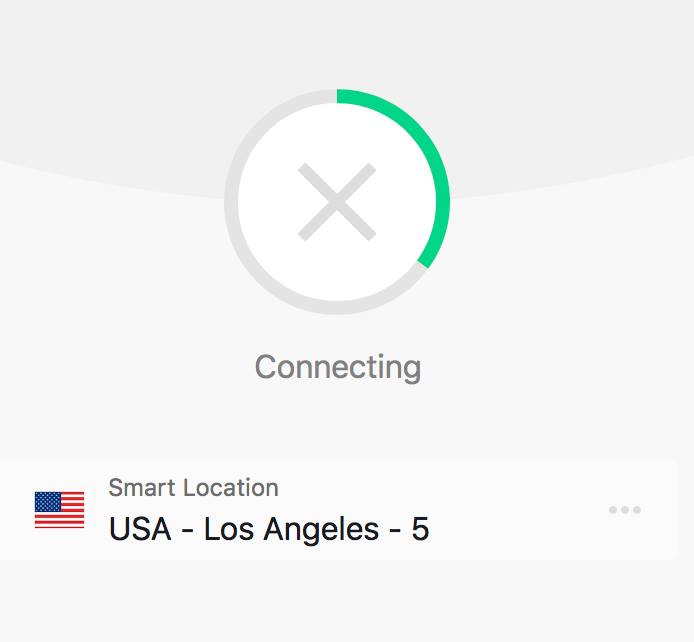
You could argue that this is par for the course so, what else has changed?
Smoking
There seems to be less of it, at least overtly. Beijing imposed a non-smoking ban for all indoor spaces in 2015, you’ll recall I was a bit disappointed by it because I’d have nowhere to smoke my cigars. There are a few places that ignore the law, but those are usually late-night eateries where it’d be impossible to find anyone sober, except maybe the staff, and who wants to deal with drunks who want to smoke? Not the staff. So, in all, smoking is less obvious in Beijing now than it was a few years back. That being the case, you can and will still see and smell people smoking in the bathroom, the go-to place for a cigarette these days. Although there are numerous “Non Smoking, you will pay a fine” signs all over the buildings, it looks as though they’re not taken quite seriously.
You can still openly buy cigarettes in the stores and you’ll still see people smoking on the streets, but it’s not as prevalent as it was even a few years ago.
No more honking
It used to be that if you went anywhere in Beijing (and much of China), you’d have to look both ways before stepping forward let you get sideswiped by some form of transport, be it a bike, car, bus or more people. However, one very noticeable change in traffic conditions here in Beijing at least it that there is much less honking. This seemed to have happened around the same time that the government put tougher restrictions on electric bikes. You’ll still hear cars obscenely honk their horns at any hesitation or delay in moving, but the bikers are far more shy these days. Though it’s quieter, now you really have to look both ways and be aware of your surroundings so you don’t get clipped by these silent torpedos.
Not many patios
Patio season might just be getting underway but there seems to be a complete lack of them, particularly in the foreigner-friendly area of Chaoyang. There still remain quite a few skewered meat (pronounced chuar, 串儿) and those are often along the streets and open late into the night. Even still, in Sanlitun, there aren’t as many places to sit out in the open other than the cordoned-off areas of a few restaurants.
Very few street vendors
Particularly at night, there used to be a few more on the street corners where you could grab a late night bite to eat. But, slowly, they’ve disappeared. This is most noticeable whenever there’s a political to-do in the city, then the streets get cleared or just about everything. There are a few remaining stalls, notably this green blob:
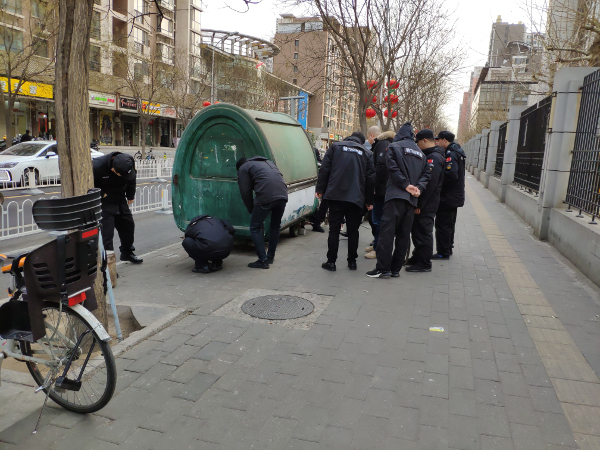
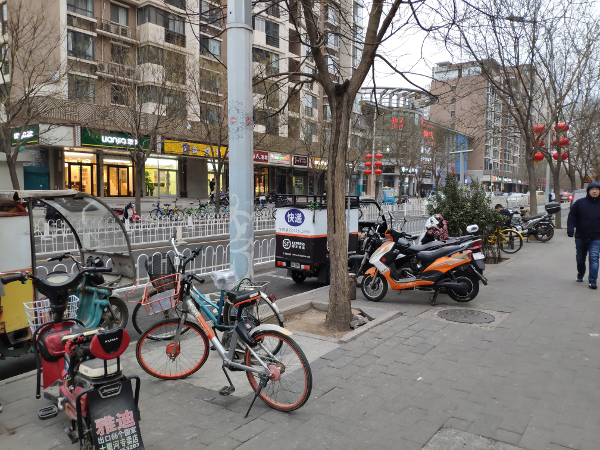
Which, as you can see, was removed. But did that last long?
No! Ha!
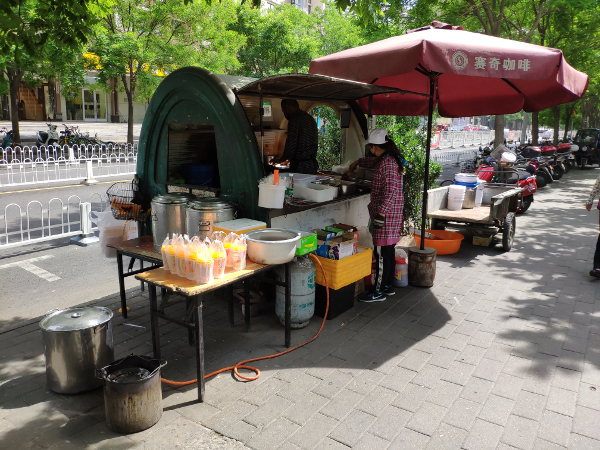
It was back in place a few days later and was serving up its normal fare of shou zhua bing and soy milk:
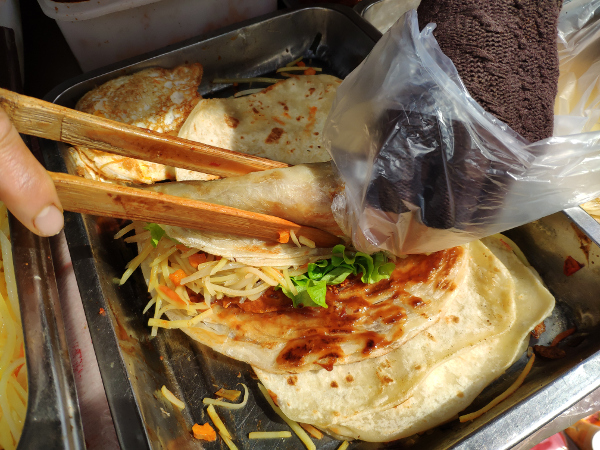
All that being said, it might not just be the government removing these places, but that online food delivery is altering the street-food landscape. And that is one thing you’ll see lots of: delivery folks.
Cars
Granted, I’m living in the moneyed district of Chaoyang in the east of Beijing so I guess it’s expected to see a bit more ostentatious display of wealth. This is where apartments are expensive and there are lots of people walking fast to work. There are also lots of cars, nice ones. I’ve mentioned before the ubiquity of the Porsches, BMWs, and Mercedes, with the odd Jaguar and Tesla thrown in, but there are also a few nicer, luxury cars, such as Lambourghinis and Ferraris. They are loud and usually it’s the kids of rich parents, but it also turns out that some of these cars were purchased overseas in Vancouver, paid with cash, and then shipped over to China all the while claiming some sort of tax refund. I don’t entirely get what they were doing but now it makes sense to see these cars. Just about all of these cars are double the price here in China and I always wondered how anyone could afford these things. Now I know why.
There was an article just put out this week about British Columbia cracking down on the sale of luxury cars in Vancouver. Apparently there was some money laundering going on. Here are some of hte cars I’ve seen on the streets in China:
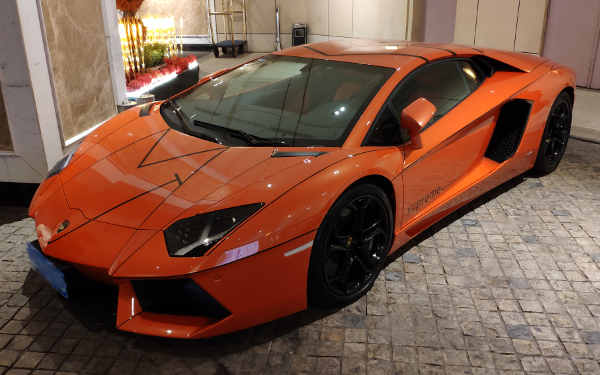
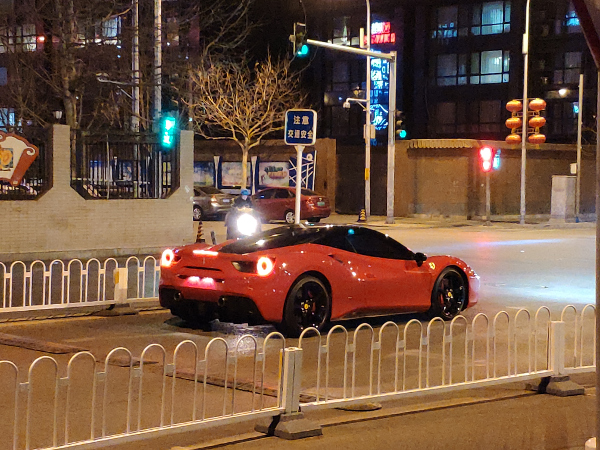
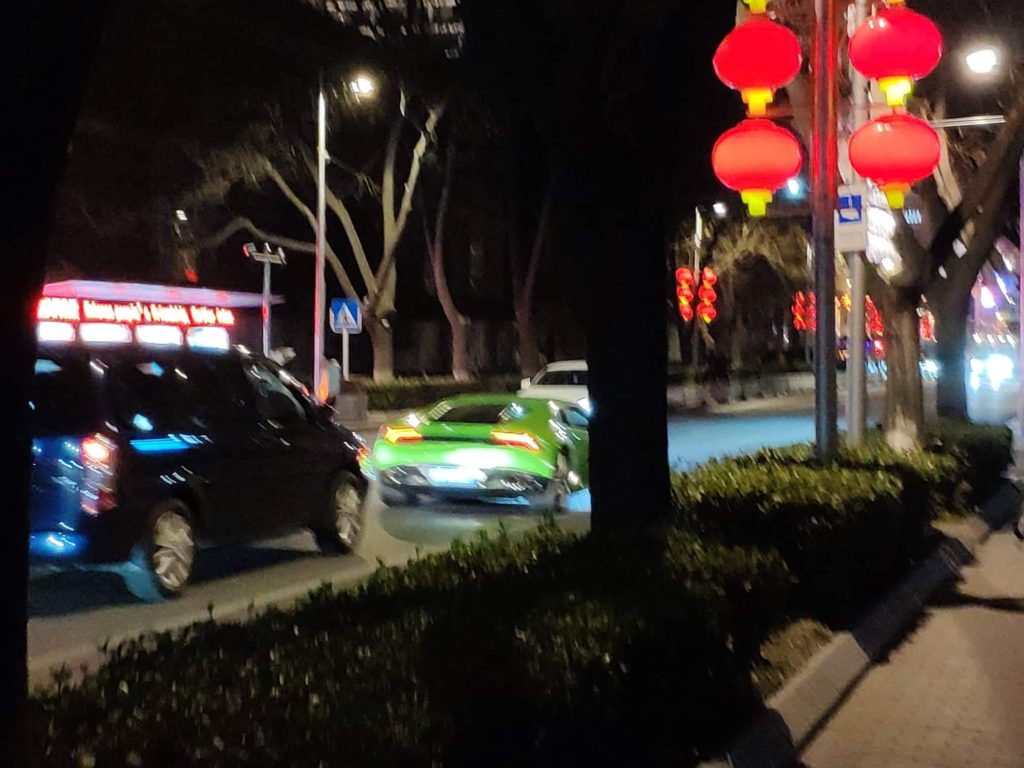
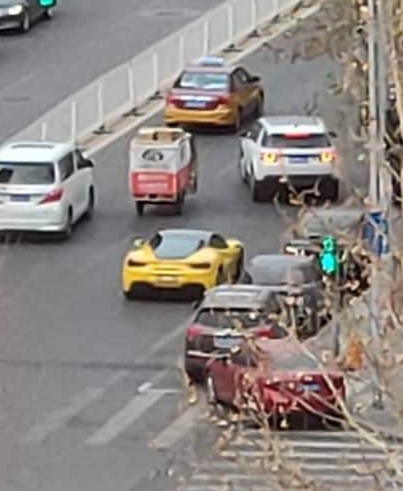
They are pretty!
There is one new car I’ve noticed recently that caught my eye not because it was anything special, but because it was a Chinese-brand electric vehicle, I think it was a Riu. There are a enough Teslas driving around Beijing to make you take notice, but what I didn’t know before was that it’s very difficult for someone to get a driver’s license if they drive a gas-powered car. Electric, however, and things get easier. Apparently if you will buy (or have bought) an electric car, then you’re put at the top of the list to get a driver’s license or driver’s permit for Beijing, something along those lines. So what’s unique about this car? The fact that it is a Chinese brand, that part of the trade war is about intellectual property theft, and Tesla has been around for a while it now looks like the Chinese auto makers are going to get into the game, too. Sadly, I wasn’t able to snap a photo of this new car just yet. I’ve seen two different colours, so I know at least two people have them!
Beijing’s CBD
Speaking of the downtown area, the CITIC Tower is almost complete in GuoMao:
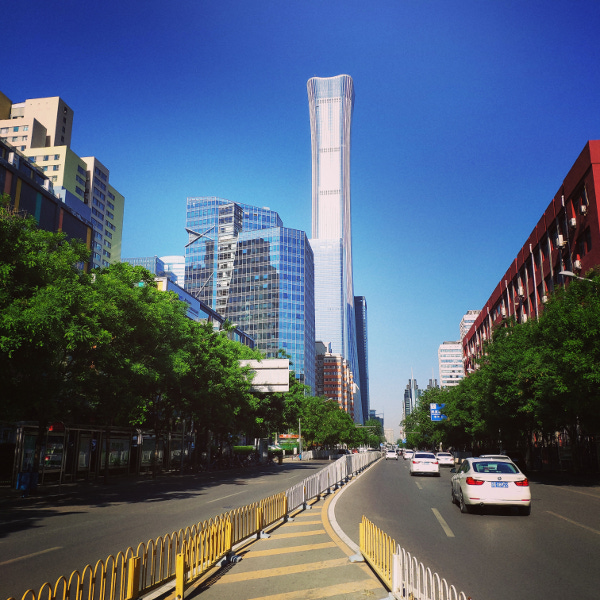
Should be finished sometime this year. The area around it, however, is yet to be finished. I’m watching the construction with interest because right now, outside of my window, it’s a nice-ish view to GuoMao. Once these newer buildings are put up, I may not have as nice a view.
Costs in the supermarket
I was thinking about how much things cost in the supermarket and, in my view, nothing has really changed very much. Though I do a lot of shopping at the local imported food store, I have been told that food costs have gone up a little bit, maybe by one or two RMB. So, for the record, I’ve put down the prices of a few items below:
- Beer (330ml) – 3.5 RMB
- Milk (1L) – 12.50 RMB
- Yogurt (plain, 400g) – 7.5 RMB
- Eggs (12-15) – 9.90 RMB
- Water (5L) – 10 RMB
- Subway ticket – 3-5 RMB (depending on distance travelled)
- Bus tickets – 1-2 RMB per trip
- Movie ticket – 43 RMB (purchased online, cheap cinemas)
We’ll see what they cost next year! 😀
Cashless transactions… for everything
One thing I’ve noticed personally is that I now use Alipay for just about everything. Many people still use WeChat for paying for everything but my choice is Alipay. Actually, it wasn’t so much a choice but a necessity because WeChat wouldn’t allow me to bind two bank cards to the same account, so I needed to use Alipay for my new bank card. For those of you who don’t know, Alipay is a subsidiary of Alibaba, which was founded by Jack Ma, who is a rather famous Chinese business man.
Automated coffee dispensers and store tellers
These have become a bit more prevalent as of late and, to be truthful, the quality isn’t that bad. It’s drinkable, on the same level as what you’d get at a hotel, but I’d still put it below what you’d get at speciality shops, such as Starbucks, or even McDonalds. As for the automated tellers at stores, they’re surprisingly easy to use. Flash the bar code at the scanner, press the button that (obviously) looks like it says “Pay Now”, flash your Alipay or WeChat QR code at the scanner, and done!
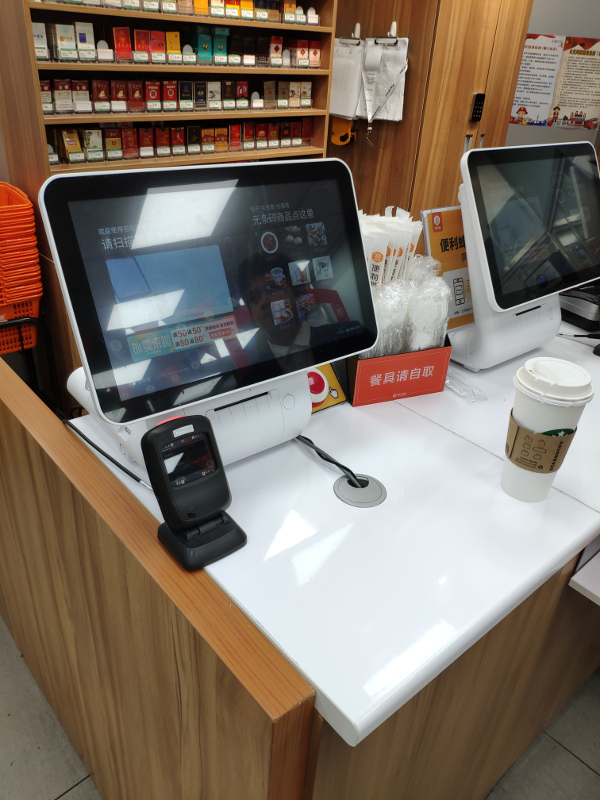
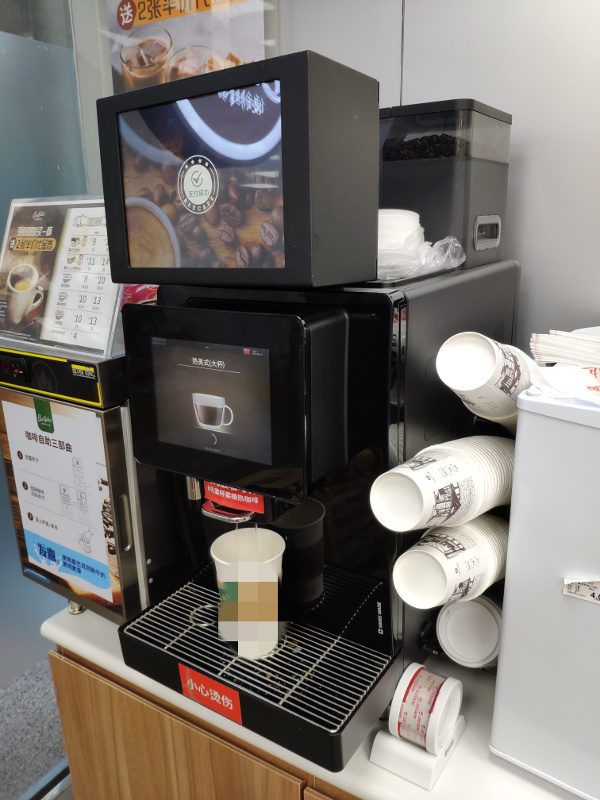
The cost for this type of coffee? Usually 8-10 RMB depending on what you’re getting (plain Americano or a latte, etc.) but often these machines give you a 50% discount for whatever reason, so the reason cost is often much lower.
Luckin Coffee

And these automated tellers follow another trend that has hit China, and that’s delivery coffee. Although Starbucks teamed up with e le me (pronounced uh-luh-muh, meaning “Hungry?” in Chinese), there is a new contender on the block that goes by the name of Luckin Coffee. Yes, I often read it as a different word but it’s the latest “big news success story” here in China (and they also just listed on the NASDAQ under the ticket symbol LK). The company hasn’t been shy about trying to take on Starbucks in the coffee game but it’s a little bit different.
First, Luckin Coffee focuses on delivery within the city limits. They pride themselves at having your order delivered within 30 minutes of ordering.
Second, cheap coffee and food. Although they’ve raised their prices since they first started, they now sell their coffees for about 6-8 RMB cheaper than Starbucks. When they first opened they practically gave the coffee away by offering a buy-one-get-one-free deal when you downloaded the APP.
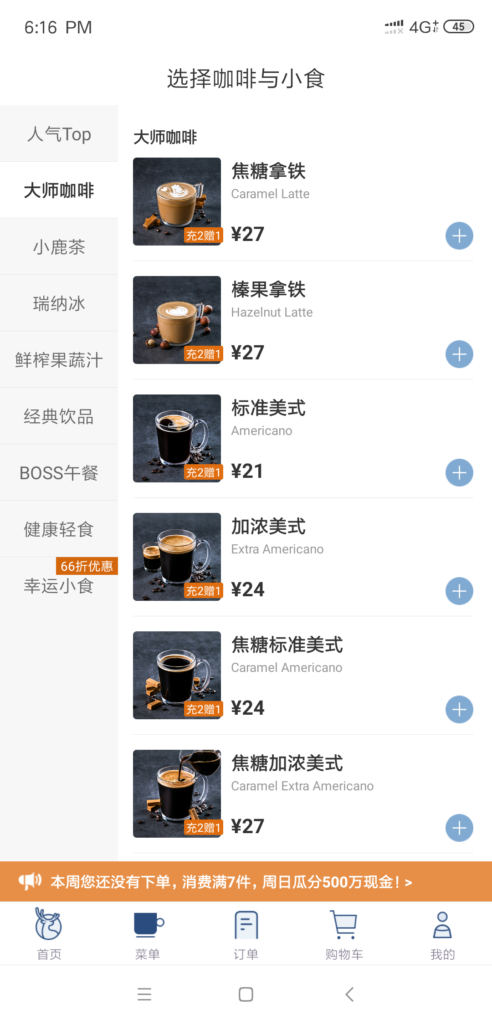
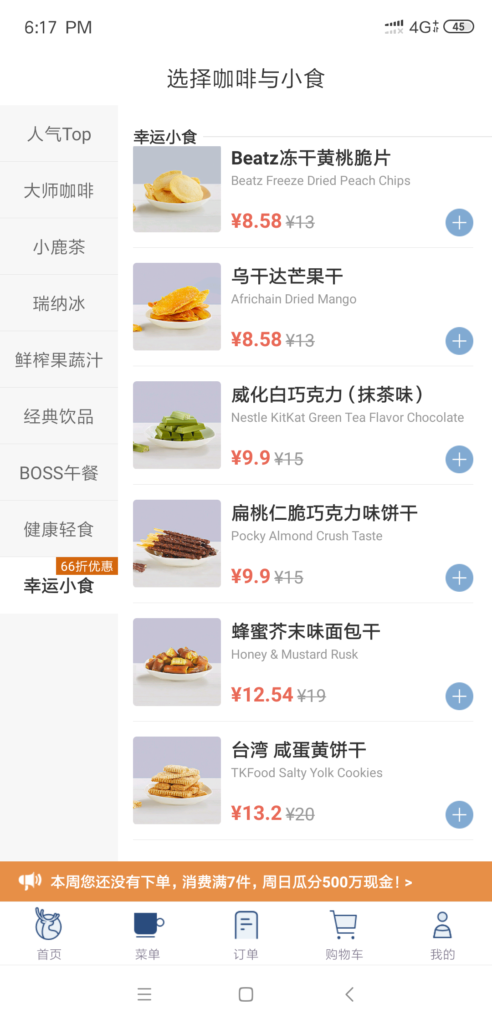
Third, their physical locations aren’t for lingering. They’re Spartan, to say the least. They’re not meant for the business casual crowd found in Starbucks but for the one-the-go worker or student. The most aggravating thing about their stores is that you cannot order at the store, you must order through the APP and then pick it up. It doesn’t matter if you’re standing right there in front of them, you must order through the APP.
All that being considered, how is it?
The coffee is so-so, on par with Costa Coffee of the UK. One thing I do enjoy are the chocolate scones, by no means healthy for you, but crammed full of chocolate chips. You’ll have to walk a lot to burn those off!
Rent
Upon renewing my rental contract, my rent did go up by $80 per month, though my landlord wanted to put it up by a bit more than that, a friend negotiated it down for me. This is common and many foreigners have similar stories in which the landlords keep increasing the price of rent until the foreigner finally moves. I can only assume the landlord starts the process again with the new tenant.
Why is this important? Well, if you read any news about potential bubbles in China, housing is one of them. Although there is still massive spending on infrastructure and on residential living areas, one has to wonder, are there that many people wanting to live there? Keep in mind the Beijing government wants to slow down the flood of people into the city and move them out a little bit.
There are two things we need to keep in mind when discussing property in China: first, you don’t so much buy an apartment so much as you buy a lease on that apartment. Second, the government (which is, ultimately, “the people”) owns the land. You can keep the building, but the government may ask for its land back or it may offer you two or three other places somewhere else to make up for the value of the apartment building they are taking.
What does that mean? That means if you lease an apartment for 1 million and the government wants the land back, then it may offer you three apartments in other areas worth about 300,000 each. So, although it looks in your favour, the truth is that you’re now moved out of the way. All this means that, on paper, these people are wealthy, but not necessarily cash-in-the-bank wealthy.
I also suspect that these people are able to borrow against their homes like so many do in the West and then, possibly (I’m not saying they do), but they can then use that money to buy something overseas, such as a car or a building or even a business or something else. That gives them something tangible but also moves money out the country, which the government is also trying to stop.
Gold
And that brings me to another point that I can speculate on but is difficult to verify, mostly because it’s a very hush hush topic. And that’s buying gold. Say whaa? Yes, gold. We don’t do this in the West very much (as least not in Canada) wherein we can walk into a bank or wherever and buy gold. I’m talking a bar of gold, however many grams or ounces, but it’s rather difficult to do in Canada. China? It’s actually quite easy.
There are a few ways: first, you can walk into any bank and ask to buy gold. Depending on the time of year (there are lucky days and major holidays that spur a lot of gold buying), you can place an order and take your gold home with you right then.
Second, you can buy online through your banking APP and then, if you want, you can arrange to pick up your physical gold at a later date. Buying online just means you can do it whenever is convenient for you rather than going directly to the bank.
The third way is to go to the mall and buy it at a jewelry shop. Not just any jewelry shop, though, the one that apparently has a good reputation is Cai Bai and you have to ask for tou zi ba, 投资吧, which means “investment bar”. If you don’t ask for investment bars then you’ll probably get sold some jewelry which is heavily marked up over and above the spot price of gold. Investment bars are available in a range of sizes, from 5g to 1kg.
Who would think you could go buy gold in a shopping mall? The things I never experienced as a child of the Canada prairies!
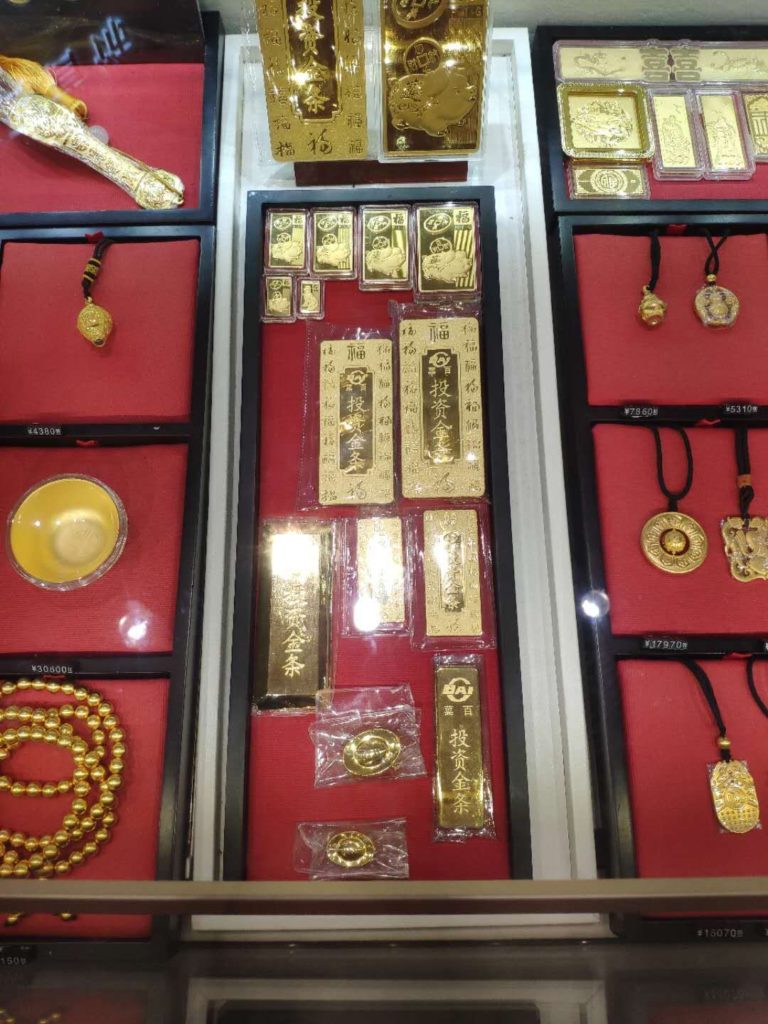
Phones got really expensive
And I’m sure this isn’t just in China. Not just the iPhone, but Samsung, Huawei, OnePlus and others seem to be moving their prices up very high. I ended up going with a Xiaomi 8 because of the price point (which I discuss in another post), though the cameras on the higher end phones are pretty damn good. These prices started going up before the current set of tariffs were placed so I don’t think that’s the only reason.
There’s always a sale
A lot of people are of the understanding, since China manufactures so much stuff, that that stuff is cheaper in China. They are also quick to ask about “knock off” brands, to which I respond, well, what’s the difference between a knock off and a competitor? Not much, really. Anyway, online shopping has made it a 24-hour past-time. There is always a sale on somewhere so, in that sense, you can always find something you want or need at a cheap price.
Amazon
Oh, and one other thing was quietly published here in China: Amazon is shuttering its business here. I don’t think I’ve ever met a Chinese person who ordered anything from Amazon.cn, instead opting to buy things through TaoBao or JD. I use JD for most of my purchases. I used to order books through Amazon but haven’t recently.
Increased tariffs
Finally, just this past week, on Tuesday May 14, 2019, China Daily reported that the Chinese government will be increasing tariffs on about $60 billion worth of imports. The new tariffs will range from 10-25% while the rest of the duties to be paid will remain at 5% According to the paper, the tariffs will hit food, chemicals and auto parts and will be put in place on June 1st. You’ll note that some US companies can apply for an exemption. Here’s a pic of the article itself:
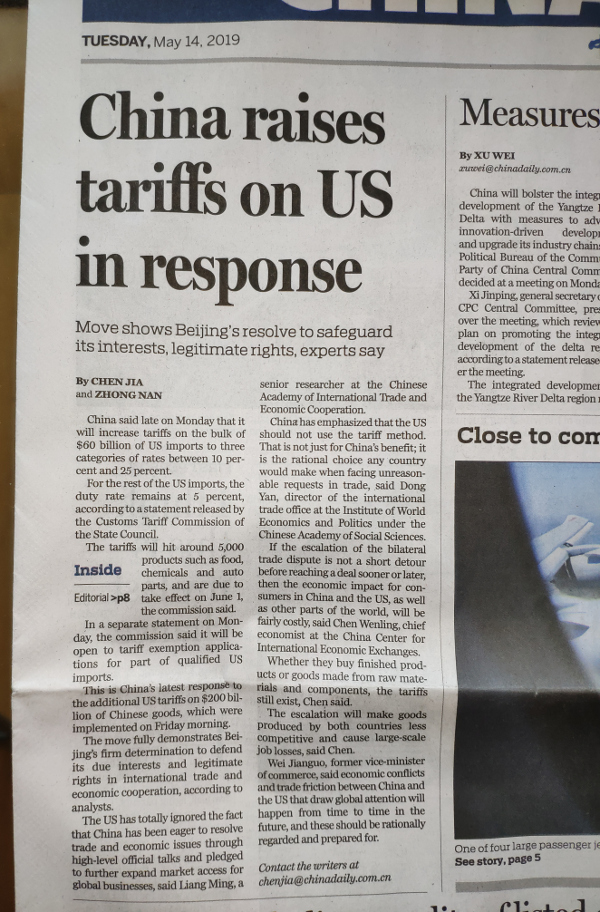
New Airport
Oh, and I’d be remiss if I didn’t mention the new airport that is about to open in the Daxing district in the south of Beijing. It’s a massive complex, said to be one of the biggest in the world, and has been built to handle some 100 million passengers a year. That’s in addition to the current airport which handles roughly the same number. So, I’m not sure if this is going to encourage more travel or simply alleviate some of the congestion going through the current BCIA. And, given that my work requires me to travel quite a bit, I’m hoping I don’t make the mistake of going to the wrong airport!
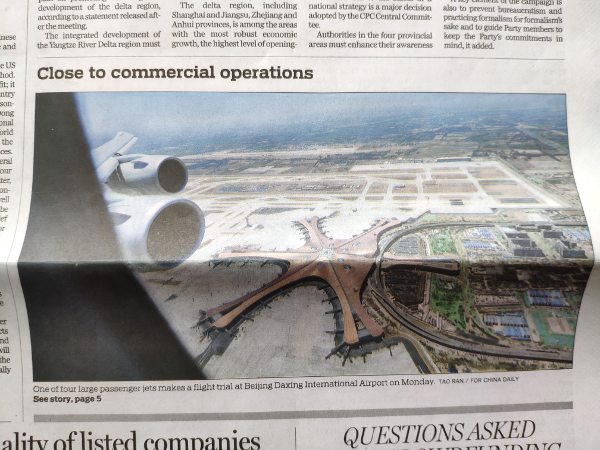
And those are a few of the changes I’ve seen or heard about over the last year. We’ll see what else changes within the next year as Beijing gears up to host the winter Olympics in 2022!
